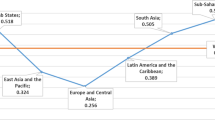Abstract
Reflexive governance, or governance institutions which include questioning of governance goals and tools from diverse perspectives, is a key part of transformative governance for sustainability. While the structure of the Sustainable Development Goals have plenty of opportunities for such reflexive governance, to date it has not figured centrally in the discussions. This article argues that reflexive governance should be a major priority for the Sustainable Development Goals going forward and that the integration of reflexivity should take account of systemic shocks in recent years. The recommendations are for a major investment in reflexivity in the peer learning mechanisms and for the development of a global roadmap for reflexivity so that the trade-offs between reflexivity and efficiency can be managed.
Similar content being viewed by others
Abbreviations
- HLPF:
-
High-level political forum
- SDGs:
-
Sustainable development goals
- U.N.:
-
United Nations
- VNRs:
-
Voluntary national reviews
References
Bandola-Gill, J., Grek, S., & Tichenor, M. (2023). The rise of the reflexive expert? Epistemic, care-ful and instrumental reflexivity in global public policy. Global Social Policy. https://doi.org/10.1177/14680181221145382
Brousseau, E., Dedeurwaerdere, T., & Siebenhüner, B. (2012). Introduction. In E. Brousseau, T. Dedeurwaerdere, & B. Siebenhüner (Eds.), Reflexive governance for global public goods (pp. 1–18). Cambridge: MIT Press. https://doi.org/10.7551/mitpress/9780262017244.003.0016
Caballero, P., & Londoño, P. (2022). Redefining development. Boulder: Lynne Rienner Publishers. https://doi.org/10.1515/9781955055475
Carraro, V., Conzelmann, T., & Jongen, H. (2019). Fears of peers? Explaining peer and public shaming in global governance. Cooperation and Conflict, 54(3), 335–355. https://doi.org/10.1177/0010836718816729
Chasek, P. S., & Wagner, L. M. (2016). Breaking the mold: A new type of multilateral sustainable development negotiation. International Environmental Agreements: Politics, Law and Economics, 16(3), 397–413. https://doi.org/10.1007/s10784-016-9320-2
Cordero, R., Mascareño, A., & Chernilo, D. (2016). On the reflexivity of crises. European Journal of Social Theory, 20(4), 511–530. https://doi.org/10.1177/1368431016668869
Dryzek, J. S., & Pickering, J. (2017). Deliberation as a catalyst for reflexive environmental governance. Ecological Economics, 131, 353–360. https://doi.org/10.1016/j.ecolecon.2016.09.011
Feindt, P. H., & Weiland, S. (2018). Reflexive governance: exploring the concept and assessing its critical potential for sustainable development. Introduction to the special issue. Journal of Environmental Policy & Planning, 20(6), 661–674. https://doi.org/10.1080/1523908x.2018.1532562
Glass, L.-M., & Newig, J. (2019). Governance for achieving the sustainable development goals: How important are participation, policy coherence, reflexivity, adaptation and democratic institutions? Earth System Governance. https://doi.org/10.1016/j.esg.2019.100031
Haas, P. M., & Stevens, C. (2017). Ideas, beliefs, and policy linkages: Lessons from food, water, and energy policies. In N. Kanie & F. Biermann (Eds.), Governing through goals: Sustainable development goals as governance innovation (pp. 137–164). Cambridge: MIT Press. https://doi.org/10.7551/mitpress/9780262035620.003.0006
High-Level Advisory Board. (2023). A breakthrough for people and planet: effective and inclusive global governance for today and the future. Tokyo: United Nations University.
Jongen, H. (2018). The authority of peer reviews among states in the global governance of corruption. Review of International Political Economy, 25(6), 909–935. https://doi.org/10.1080/09692290.2018.1512891
Leach, M., Scoones, I., & Stirling, A. (2010). Governing epidemics in an age of complexity: narratives, politics and pathways to sustainability. Global Environmental Change, 20(3), 369–377. https://doi.org/10.1016/j.gloenvcha.2009.11.008
Meadowcroft, J. (2009). What about the politics? Sustainable development, transition management, and long term energy transitions. Policy Sciences, 42(4), 323–340. https://doi.org/10.1007/s11077-009-9097-z
ODI. (2018). SDG Progress: Fragility, crisis and leaving no one behind. https://cdn.odi.org/media/documents/12424.pdf.
UN ECOSOC. (2016). Multi-Stakeholder Forum on Science, Technology and Innovation for the Sustainable Development Goals: Summary by the Co-Chairs. E/HLPF/2016/6.
UN ECOSOC. (2020). Summary by the President of the Economic and Social Council of the High-Level Political Forum on Sustainable Development Convened Under the Auspices of the Council at Its 2020 Session.
UN ECOSOC. 2022. Ministerial Declaration of the High-Level Segment of the 2022 Session of the Economic and Social Council and the 2022 High-Level Political Forum on Sustainable Development, Convened Under the Auspices of the Council, on the Theme ‘Building Back Better from the Coronavirus Disease (COVID-19) While Advancing the Full Implementation of the 2030 Agenda for Sustainable Development’. E/HLS/2022/1.
UN Secretary General. (2023). Progress towards the Sustainable Development Goals: Towards a Rescue Plan for People and Planet. A/78/XX-E/2023/XX.
United Nations General Assembly. (2015). Transforming Our World: The 2030 Agenda for Sustainable Development. A/RES/70/1.
Voß, J.-P., & Bornemann, B. (2011). The politics of reflexive governance: Challenges for designing adaptive management and transition management. Ecology and Society. https://doi.org/10.5751/es-04051-160209
Voß, J.-P., Kemp, R., & Bauknecht, D. (2006). Reflexive governance: A view on an emerging path. In J.-P. Voß, D. Bauknecht, & R. Kemp (Eds.), Reflexive governance for sustainable development (pp. 419–438). Cheltenham: Edward Elgar. https://doi.org/10.4337/9781847200266.00029
Author information
Authors and Affiliations
Corresponding author
Ethics declarations
Conflict of interest
There is no conflict of interest for the author and this article.
Additional information
Publisher's Note
Springer Nature remains neutral with regard to jurisdictional claims in published maps and institutional affiliations.
Rights and permissions
Springer Nature or its licensor (e.g. a society or other partner) holds exclusive rights to this article under a publishing agreement with the author(s) or other rightsholder(s); author self-archiving of the accepted manuscript version of this article is solely governed by the terms of such publishing agreement and applicable law.
About this article
Cite this article
Stevens, C. Strengthening reflexive governance to achieve the 2030 Agenda and the SDGs. Int Environ Agreements 23, 173–178 (2023). https://doi.org/10.1007/s10784-023-09610-0
Accepted:
Published:
Issue Date:
DOI: https://doi.org/10.1007/s10784-023-09610-0




